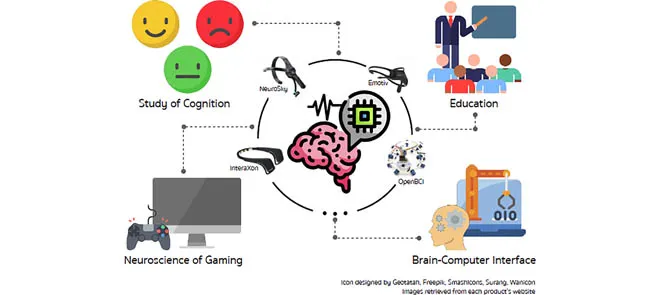Consumer Grade EEG measuring sensors as research tools: A Review
EEG (Electroencephalography) is a non-invasive process to record the electrical activity of the brain. It has been successfully used in medicine to diagnose neurological and psychiatric disorders such as epilepsy, sleep disorders, attention deficit hyperactivity disorder (ADHD), and history of depression since its invention in 1924. These signals help to decipher the variety of brain functions, including motor, sensory, and cognition.
Consumer-grade EEG devices are more accessible for personal and everyday use at home, as well as educational and research institutes, for its portability and affordability compared to the bulky, expensive, and complicated Medical grade EEG devices. Emotiv, interaXon, Melon, NeuroSky, OpenBCI, and X wave are some of the leading manufacturers of EEG devices.
Advanced hardware introduced through emerging technology has helped develop wireless, wearable, low cost, single-channel and lightweight portable EEG devices. The device’s wearable design assists persons with neuromuscular disorder to directly control the computer via brain activities, thus making it possible to manage routine functions through computers.
The convenience of use has helped the researchers, neurologists, psychologists, and educationists to study and understand the brain functions, emotions, attention, meditation, memory, perception, brain-to-brain synchrony, engagement time and mental processing of the individuals. EEG data are the beginning of Brain Controlled Computers. For researchers it allows tapping into subconscious mind behind face recognition, study of brain’s response to visual, auditory and tactile stimulations, 3-D space interaction among many. It has been a great contributor to facilitate in the rehabilitation process of patients.
The advanced research in consumer grade EEG is progressing along with data-driven computational intelligence, such as deep learning. These lightweight EEG devices become handy in collecting huge data for deep learning based modelling of brains. However, along with its use in medical sciences, one cannot deny its importance in its emerging applications in educational researches and gaming advancement. It can easily capture the attention span, memory, perception, feelings and emotions during gaming, thus assisting in real-time study and researches. It helps develop mobile games, video games, computer games and also serious games which are meant for education and training. Neurogaming is another billion dollar area where a player controls the game by brain signals.
No wonder soon it will become a household gadget instead of a medical device.




